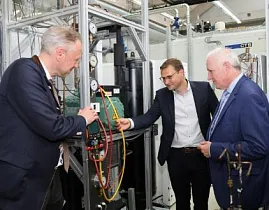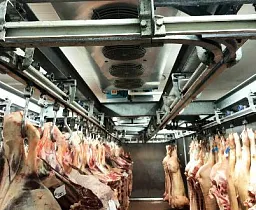Cool Concerns, the refrigeration and air conditioning training specialist, has developed what is believed to be the UK’s first training rig for A2L refrigerants.
The fully working system, designed in accordance with EN 378:2016, operates on R.454C (Opteon XL20) and gives installers and service engineers the opportunity to have hands-on experience with one of the promising new lower flammability A2L refrigerants now coming on-stream.
Developed by Chemours, R.454C has a Global Warming Potential of 148, just under the important 150 GWP threshold. The training rig is based on a
BITZER LH32E/2KES-05Y air-cooled condensing unit, equipped with the company’s semi-hermetic Ecoline compressor, connected to a LuVe evaporator.
The electrical control system and related components have all been risk-assessed for use with A2L refrigerants, with labelling giving suitable operator guidance and warnings, including flammable signage.
The training rig includes a refrigerant gas detection system that, in the event of activation, closes the E2V expansion valve so all refrigerant is pumped down to the condensing unit and liquid line.
The expansion device itself is mounted outside the cooled space. In the event of the gas detection being activated, the system pumps down so the remaining refrigerant cannot escape into a cold room. The gas detector also activates a remote audible alarm and strobe light to warn personnel working in and around the coldroom of a potential leak.
All service tools used with the system are approved for use with A2L refrigerants, including the electronic gauge manifold, leak detector, ventilation fan, recovery machine and vacuum pump.
Stephen Benton, director of Cool Concerns, says: “The clock is ticking on higher GWP refrigerants, and the industry is preparing to make the next big step to the use of lower-GWP A2L alternatives.
“A lot has been written and debated about the use of A2Ls. However, it all becomes much clearer when you come face-to-face with a working system. To date, there has been a relatively slow uptake of A2L options. However, we expect this to change significantly in the coming months as the F-Gas phase-down on higher GWP refrigerants begins to bite.”
He added: “There are more challenges in moving to A2L options such as R454C than, say, from R410A to R32, as air conditioning systems tend to come as complete packaged solutions. With an A2L refrigeration application, system design and component choice are much more likely to be the responsibility of the contractor –and therefore require much more careful thought and planning.”
Cool Concerns is at the forefront of training in the use of flammable refrigerants such as hydrocarbons, and high pressure alternatives such as carbon dioxide. It will use the new A2L rig as part of its flammable refrigerants training course, and in dedicated training for contractors and end users as part of due diligence preparations in the switch to A2L systems.
Kevin Glass, managing director of BITZER UK, said: “We commend Cool Concerns proactive approach in this key area, to help industry make the transition to lower GWP alternatives. We have a common goal in supporting contractors and end users to make the switch; BITZER’s comprehensive range of low GWP solutions is proven and ready to meet the need.”
Cool Concerns has produced a practical guide for designers of A2L systems to comply with EN 378:2016 as part of its ongoing training programmes. For more details on A2L training courses, contact Stephen Benton via
steve@coolconcerns.co.uk






